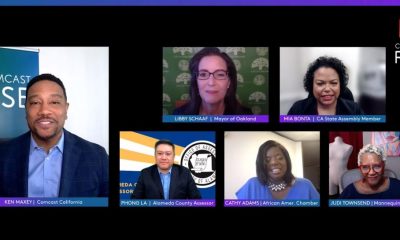Business
Comcast Abandons Time Warner Cable Bid After Gov’t Pushback

This Feb. 11, 2011 file photo shows the Comcast logo on one of the company’s vehicles, in Pittsburgh. Wall Street appears increasingly convinced Comcasts $45.2 billion purchase of Time Warner Cable is dead. telling indicator is the gap between the value Comcasts all-stock bid assigned to each Time Warner Cable share and Time Warner Cable stocks current price. That was at its widest point yet Thursday, April 23, 2015, a signal that investors are giving just 20 to 30 percent odds that the deal will go through, said Nomura analyst Adam Ilkowitz. (AP Photo/Gene J. Puskar, File)
TALI ARBEL, AP Business Writers
MICHELLE CHAPMAN, AP Business Writers
NEW YORK (AP) — What killed Comcast’s $45 billion bid for Time Warner Cable? Regulators’ desire to protect the Internet video industry that is reshaping TV.
A combination of the No. 1 and No. 2 U.S. cable companies would have put nearly 30 percent of TV and about 55 percent of broadband subscribers under one roof, along with NBCUniversal, giving the resulting behemoth unprecedented power over what Americans watch and download.
Competitors, consumer groups, and politicians have criticized the deal, saying it would lead to higher prices and less choice.
“The proposed merger would have posed an unacceptable risk to competition and innovation, including to the ability of online video providers to reach and serve consumers,” Federal Communications Commission Chairman Tom Wheeler said in a written statement.
The Justice Department said that Comcast dropped its bid because of regulators’ concerns that the Philadelphia-based cable giant would become an “unavoidable gatekeeper” for Internet services.
One of the concerns consumer advocates and competitors had with the Comcast deal was that it could undermine the streaming video industry that is reshaping TV. Comcast could, for example, require onerous payments from new online-only video providers for connecting to its network. Dish, the satellite TV company behind the new Web video service Sling TV, and Netflix opposed the deal.
“It goes to show you how important broadband is,” said Amy Yong, a Macquarie analyst.
Regulators have taken other steps that signal how important they consider Internet access. The Federal Communications Commission in February released new “Net Neutrality” rules meant to keep broadband providers from charging Internet companies for “fast lane” access or favoring some content. The broadband industry has sued to stop the rules.
“We have to live with it, and respect that, and move on,” Comcast chairman and CEO Brian Roberts said in an interview on CNBC, referring to the government’s opposition to the deal. “We always structured this deal in a way that would enable us to walk away.”
Comcast doesn’t owe Time Warner Cable a breakup fee because the deal didn’t work out.
With the deal between Comcast Corp. and Time Warner Cable Inc. called off, a transaction with Charter Communications Inc. aimed at smoothing the way for regulatory approval also falls apart.
Even with the Comcast and Time Warner Cable deal being nixed, cable companies are likely to keep combining as costs rise for the shows, sports and movies they pipe to subscribers and video customers decrease.
Many analysts expect that Charter Communications could resurrect its own effort to acquire Time Warner Cable.
A combined Charter and Time Warner Cable would have 15 million video customers and 16.5 million Internet customers. That’s still smaller than Comcast alone, which has 22.4 million video subscribers and 22 million Internet customers.
And the $48.5 billion combination of DirecTV and AT&T is still expected to go through.
Shares of Time Warner Cable Inc. rose $2.74 to $151.50 in morning trading while Comcast shares slipped 8 cents to $59.18.
___
Follow Tali Arbel at http://twitter.com/tarbel
Copyright 2015 The Associated Press. All rights reserved. This material may not be published, broadcast, rewritten or redistributed.
Activism
Oakland Post: Week of April 17 – 23, 2024
The printed Weekly Edition of the Oakland Post: Week of April 17 – 23, 2024

To enlarge your view of this issue, use the slider, magnifying glass icon or full page icon in the lower right corner of the browser window. ![]()
Business
V.P. Kamala Harris: Americans With Criminal Records Will Soon Be Eligible for SBA Loans
Speaking in Las Vegas on Jan. 27, Vice President Kamala Harris announced a forthcoming federal rule that will extend access to Small Business Administration (SBA) loans to Americans who have been convicted of felonies but have served their time. Small business owners typically apply for the SBA loans to start or sustain their businesses.

By California Black Media
Speaking in Las Vegas on Jan. 27, Vice President Kamala Harris announced a forthcoming federal rule that will extend access to Small Business Administration (SBA) loans to Americans who have been convicted of felonies but have served their time.
Small business owners typically apply for the SBA loans to start or sustain their businesses.
Harris thanked U.S. Rep. Steven Horsford (D-NV-04), the chair of the Congressional Black Caucus, for the work he has done in Washington to support small businesses and to invest in people.
“He and I spent some time this afternoon with business leaders and small business leaders here in Nevada. The work you have been doing to invest in community and to invest in the ambition and natural capacity of communities has been exceptional,” Harris said, speaking to a crowd of a few hundred people at the Brotherhood of Electrical Workers Hall in East Las Vegas.
On her daylong trip, Harris was joined by Horford, SBA Administrator Isabella Guzman, Interim Under Secretary of Commerce for Minority Business Development Agency (MBDA) Eric Morrissette, and Sen. Catherine Cortez Masto (D-Nev).
“Formerly incarcerated individuals face significant barriers to economic opportunity once they leave prison and return to the community, with an unemployment rate among the population of more than 27%,” the White House press release continued. “Today’s announcement builds on the Vice President’s work to increase access to capital. Research finds that entrepreneurship can reduce recidivism for unemployed formerly incarcerated individuals by as much as 30%.”
Business
G.O.P. Lawmakers: Repeal AB 5 and Resist Nationalization of “Disastrous” Contractor Law
Republican lawmakers gathered outside of the Employee Development Department in Sacramento on Jan. 23 to call for the repeal of AB5, the five-year old California law that reclassified gig workers and other independent contractors as W-2 employees under the state’s labor code.

By California Black Media
Republican lawmakers gathered outside of the Employee Development Department in Sacramento on Jan. 23 to call for the repeal of AB5, the five-year old California law that reclassified gig workers and other independent contractors as W-2 employees under the state’s labor code.
Organizers said they also held the rally to push back against current efforts in Washington to pass a similar federal law.
“We are here to talk about this very important issue – a battle we have fought for many years – to stop this disastrous AB 5 policy,” said Assembly Republican Leader James Gallagher (R-Yuba City).
Now, that threat has gone national as we have seen this new rule being pushed out of the Biden administration,” Gallagher continued.
On Jan. 10, the U.S. Department of Labor issued a new rule providing guidance on “on how to analyze who is an employee or independent contractor under the Fair Labor Standards Act (FLSA).”
“This final rule rescinds the Independent Contractor Status Under the Fair Labor Standards Act rule (2021 IC Rule), that was published on January 7, 2021, and replaces it with an analysis for determining employee or independent contractor status that is more consistent with the FLSA as interpreted by longstanding judicial precedent,” a Department of Labor statement reads.
U.S. Congressmember Kevin Kiley (R-CA-3), who is a former California Assemblymember, spoke at the rally.
“We are here today to warn against the nationalization of one of the worst laws that has ever been passed in California, which has devastated the livelihoods of folks in over 600 professions,” said Kiley, adding that the law has led to a 10.5% decline in self-employment in California.
Kiley blamed U.S Acting Secretary of Labor, July Su, who was the former secretary of the California Labor and Workforce Development Agency, for leading the effort to redefine “contract workers” at the federal level.
Kiley said two separate lawsuits have been filed against Su’s Rule – its constitutionality and the way it was enacted, respectively. He said he is also working on legislation in Congress that puts restrictions on the creation and implementation of executive branch decisions like Su’s.
Assemblymember Kate Sanchez (R-Rancho Santa Margarita) announced that she plans to introduce legislation to repeal AB 5 during the current legislative session.
“So many working moms like myself, who are also raising kids, managing households, were devastated by the effects of AB 5 because they lost access to hundreds of flexible professions,” Sanchez continued. “I’ve been told by many of these women that they have lost their livelihoods as bookkeepers, artists, family caregivers, designers, and hairstylists because of this destructive law.”
-

 Activism4 weeks ago
Activism4 weeks agoOakland Post: Week of March 20 – 26, 2024
-

 #NNPA BlackPress3 weeks ago
#NNPA BlackPress3 weeks agoCOMMENTARY: D.C. Crime Bill Fails to Address Root Causes of Violence and Incarceration
-

 #NNPA BlackPress3 weeks ago
#NNPA BlackPress3 weeks agoMayor, City Council President React to May 31 Closing of Birmingham-Southern College
-

 #NNPA BlackPress4 weeks ago
#NNPA BlackPress4 weeks agoCOMMENTARY: Lady Day and The Lights!
-

 #NNPA BlackPress3 weeks ago
#NNPA BlackPress3 weeks agoFrom Raids to Revelations: The Dark Turn in Sean ‘Diddy’ Combs’ Saga
-

 Activism3 weeks ago
Activism3 weeks agoOakland Post: Week of March 27 – April 2, 2024
-

 #NNPA BlackPress4 weeks ago
#NNPA BlackPress4 weeks agoBaltimore Key Bridge Catastrophe: A City’s Heartbreak and a Nation’s Alarm
-

 #NNPA BlackPress3 weeks ago
#NNPA BlackPress3 weeks agoBaltimore’s Key Bridge Struck by Ship, Collapses into Water




















































